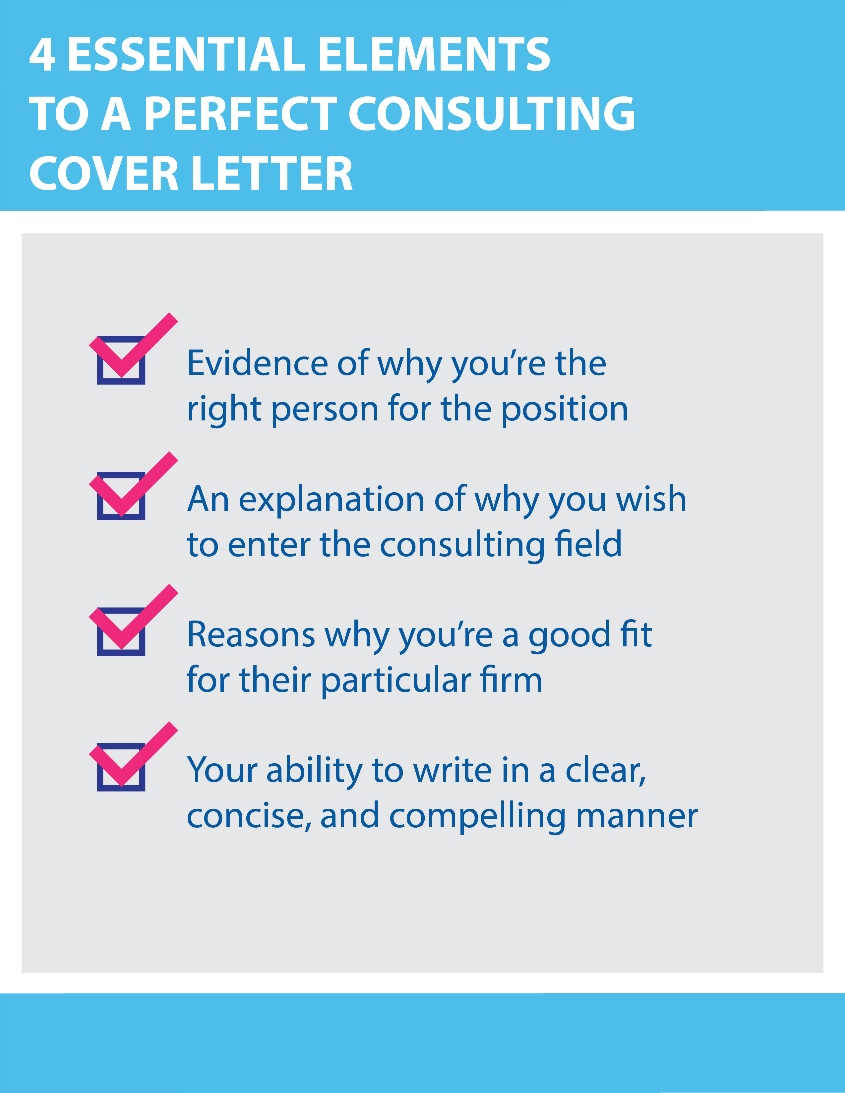FREE Resume Tips Email and Video Series
This form collects your name and email so that we can add you to our email list that delivers the free resources you are requesting. Check out our privacy policy for details on how we protect and manage your submitted data.
We’ll never spam you or share your email. Unsubscribe at any time.
Your cover letter can make a big difference when applying for a management consulting position. Because the cover letter is typically read before your resume, it plays an essential chronological role during the application process.
Consulting firms will typically read your cover letter to quickly identify what makes you different from thousands of other applicants. Therefore, writing a strong and unique cover letter can make you stand out from the competition and ensure that your achievements aren’t overlooked.
A strong cover letter presents an excellent opportunity for you to demonstrate why you’re the best candidate for the job, and to plead your case as to why the firm should hire you over other applicants.
This guide will cover 11 essential steps towards writing the perfect consulting cover letter.
Tip 1 — Know What Consulting Firms Are Looking For
The top consulting firms receive hundreds of thousands of applications each year. For example, McKinsey receives approximately 200,000 applications annually, of which only 2,000 applicants receive an offer. Consulting firms are faced with the arduous task of narrowing down the candidate pool to include only the best.
Interviewing candidates is not a cheap process. The firm wants to ensure that any candidate they interview is qualified for the position, is prepared for management consulting as a career, and is a good fit for the firm.
Therefore, top consulting firms look for four essential elements in a cover letter.
- Evidence of why you’re the right person for the position
- An explanation of why you wish to enter the consulting field
- Reasons why you’re a good fit for their particular firm
- Your ability to write in a clear, concise, and compelling manner

When reading cover letters, screeners will often ask,“Did the applicant spend enough time preparing a strong letter? Have they done their homework regarding the firm and the position in question? Do they have adequate writing skills to prepare compelling emails, reports, and presentations?“
A cover letter is a challenging document to prepare. You may feel worn out after spending hours on your resume, only to realize that you also need to spend as much time (if not more) on your cover letter.
Rather than looking at your consulting cover letter as an annoying extra step, think of it as an excellent opportunity to emphasize your skills and experiences and to set yourself apart from other applicants.
Tip 2 — Make Sure the Letter Has TheseFiveDistinct Sections
While your cover letter doesn’t need to take a formulaic approach, there are five distinct sections that should be covered. They are:
- An Introduction
The introduction should contain which position you’re applying for, your name, address, and contact information. It should also be short, sweet, and entertaining. Write it in such a way that the screener will want to keep reading into the second paragraph.
- Why You’re a Great Candidate
This is the section where you should blow your own horn. Each sentence should speak to your skills, education, and experiences — tying everything back to why you’re a great candidate. Ideally, this section should include your top three achievements to date (relevant to consulting, of course).
- Why Consulting is the Right Fit for You
Remember that the top priority of most consulting firms is to find out whether you’ll become a great consultant if hired. Even with memorable and unique qualifications, a recruiter may not be convinced that these skills will make you a good management consultant. To leave no doubt in their mind, dedicate a section towards explaining why you’re the right person for the job. You can use previous experiences (such as internships, jobs, or academic courses) to tie your career goals to the position in question.
- Why You’re Applying for the Position
The next section should cover why you chose to apply for this exact position in this firm. When laying out your case, identify unique reasons as to why you think McKinsey, Bain, BCG, Deloitte, or any other firm is your firm of choice. To make a compelling argument, identify specific people, reports, or projects that make your story believable. Don’t hesitate to mention specific employees or projects that caught your eye and sparked your interest.
- A Solid Conclusion
Finalize the letter by restating why you believe you’re a great candidate and how you can be of value to the company.
Tip 3 — LinkYour Cover Letter to Your Resume

A consulting cover letter is essentially an opportunity for you to expound on the information you wrote in your resume. What does this mean? It means that your cover letter should highlight the unique achievements, skills, and experiences (relevant to the position) that make you stand out from other applicants.
Your resume and cover letter should work hand in hand to strengthen your application further and demonstrate what makes you stand out.
Start off by identifying what you want the consulting firm to know about you. Draw attention to your career achievements. Maybe you started a business and sold it for a significant profit, or you worked overseas for a few years and have a diverse skillset.
Make sure that unique experiences are mentioned in the first few paragraphs of your cover letter to pique the interest of the resume screener.
Many resume screeners don’t actually read your entire resume.They simply scan it to identify specific items that make you stand out. Because resume screeners scan through hundreds of resumes at a time, they can easily overlook your unique achievements.
The cover letter is your opportunity to prevent this from happening. When you go into detail about achievements in your cover letter, you essentially draw the attention of screeners (and thus give yourself a better chance to land an interview).
Tip 4 — Don’t Forget About Your Resume
Even after referencing the unique skills you have in your cover letter, you need a strong consulting resume to back up your claims. A consulting resume is different from other standard template resumes, as it needs to emphasize a combination of skills that can make you successful as a consultant.
Here are resources that can help you prepare a strong consulting resume. A quality consulting resume will take just as much attention to detail as writing a strong cover letter will. In a nutshell, writing a consulting resume requires you to reflect on your past experiences, select the ones that are most relevant to consulting, and summarize them in a manner that resume screeners can easily scan and digest.
Top consulting firms typically look for the following in your resume:
- Big brand names (employers and schools)
- Strong academic performance (high GPA)
- Strong analytical skills (demonstrated in high standardized test scores)
- Strong leadership and communication skills
- Achievements versus career years (the longer your career is, the more achievements that screeners expect to see)

Also, refer to this resource to identify the top five mistakes that applicants make when writing a consulting resume.
Tip 5 — Avoid Using a Standard Template for Your Cover Letter
It’s no secret that it can be a pain to write a strong cover letter. It takes a lot of time and reflection. You’ll have to revise and edit the piece multiple times before submitting it. But, to truly stand out from other applicants, your letter needs to be interesting, personal, and unique.
The biggest mistake you can make is to copy a standard cover letter template and simply plug in your name and skillset. Screeners hate standard form letters because they’re boring to read, and they show that you’re unwilling to put in the necessary time and effort to write something unique. Because recruiters read thousands of cover letters, they can easily tell when a cover letter is written from a template.
When writing your consulting cover letter, make sure that every sentence is unique. While you may draw inspiration from various templates, add your personal twist to each word and modify it in a manner that emphasizes your unique skillset. For example, instead of starting with the usual format:
“Dear Sir/Madam, I write to apply for a consulting position….”
You can make things more interesting by starting off with what makes you different. Here’s an example:
“After attending Harvard for both my undergraduate and MBA education, I am confident in my ability to become successful as a [insert job position here] at McKinsey.”
Another example:
“My experiences overseas as a Peace Corps volunteer put me in a position to be successful as a [insert job position here] at BCG.”
The idea is to make every sentence in your cover letter count. Add a personal twist to all ofyour skills and experiences and tie them to the job responsibilities of the open position.
Tip 6 — Highlight Your Skills and Experiences via Evidence-Based Storytelling
In your cover letter, the goal should be to tell your story. Rather than simply listing your skills and abilities, demonstrate how various experiences have molded you into the perfect candidate for the position in question. Strive to show that you have what it takes, instead of telling.
For instance, instead of simply stating that you can lead, give a specific example of an experience where you showed leadership qualities. This evidence-based approach shows recruiters that your prior experiences have equipped you with the necessary skills to be successful.
Telling a story makes your cover letter much easier to read. It also makes you stand out from thousands of other applicants who may simply state “I’m a leader,” or, “I’m a hard worker.”
As you use this evidence-based approach, tailor every experience you mention to a specific skillset that is required for the job. If the position requires a candidate with strong interpersonal skills, explain a time when you worked within a team to achieve tangible results. Also, list out any challenges and how you overcame them.
It’s not simply about telling a story. Rather, it’s about telling a story that highlights why you’re a good fit for the job, as well as what makes you stand out from the competition.
Tip 7 — Show Your Value
A common mistake that many applicants make is to only think about personal achievements when applying for consulting positions. Recruiters often read through cover letters that have lots of “me meme” in them.
This is to say that many applicants focus on how they can benefit personally from the position in question, instead of demonstrating how they can become valuable employees (and eventually partners).
Many cover letters talk only about how the candidate will be able to elevate his/her career, experiences, and skills. Such letters only focus on personal goals instead of demonstrating how you can help the company become better. Remember that screeners are looking for candidates who will be of benefit to the firm, not those who are simply using this as an opportunity to enrich themselves and their careers.
When writing your cover letter, emphasize how your skillset will be of benefit to the company. To do this successfully, you need to do your research with regards to what the short-term and long-term goals of the firm are. You can then use these goals and relate them to your unique abilities and experiences.
Tip 8 — One Page Is the Perfect Length
It can be tempting to write a long cover letter, especially if you have a diverse skillset that you feel should be highlighted. However, being concise and keeping it relevant to the position is a much better strategy.
Aim to select only the most relevant experiences that apply directly to the position you’re seeking. You can typically fit these experiences in only one page.
Being concise also makes it easier for recruiters to read through your cover letter quickly without overlooking anything. Edit it down to a concise letter by re-reading and adjusting your original cover letter. The more you read it, the more unnecessary words and content you will find to take out.
Start early so that you can give yourself plenty of time to adjust your cover letter accordingly.
Tip 9 — Be Specific About the Position You’re Applying To
While this may sound obvious, many applicants tend to go off on a tangent about their skills and abilities without first mentioning the job they’re applying for. You should always state the position and office of the job you intend to apply for within the first sentence.
Remember that this information can still be included as you emphasize what makes you different. Here’s an example of an opening sentence that was used earlier in this guide:
“My experiences overseas as a Peace Corps volunteer put me in a position to be successful as a [insert job position here] at BCG.”
Being specific and concise about the job you’re applying for will make it easier for screeners to quickly recognize which position you are interested in.
Tip 10 — Give Yourself Time to Write a Quality Letter
Similar to consulting resumes, writing a strong consulting cover letter takes time. To be successful, you need to consider everything you’ve accomplished as well as what makes you different from everyone else. Don’t think that you can write a strong cover letter in one night. It requires multiple iterations, careful re-reading, and timely feedback.
You also need to make sure that the cover letter blends seamlessly with your resume, and it expounds on the outstanding skills and experiences contained in the resume itself.
Tip 11 — Proofread Thoroughly

And finally, make sure you eliminate any grammatical or spelling mistakes from the final cover letter. These mistakes make you appear careless and can result in being disqualified in the screening process. Don’t let something so simple be your downfall.
Take time to proofread. Ask peers and fellow professionals review your cover letter and give you feedback as well.
Example
Here is an example cover letter that highlights the tips I’ve mentioned. Reference this example as you write your cover letter to make sure that you hit all of the important sections. These items do not necessarily need to appear in the order I have them listed. But, make sure that they are all represented in your cover letter. Below is an example consulting cover letter.
You can also download the example by clicking here.

More Resources:
Free Case Interview Prep Program – Sign Up For Free Instant Access to the Largest Collection of FREE Case Interview Training Resources.
We’ll never spam you or share your email. Unsubscribe at any time.




219 thoughts on “Consulting Cover Letter Tips (and Template)”
Victor,
I am currently a 2nd year MBA/MSF (Master of Science in Finance) candidate at Northeastern University with concentration in Corporate Finance. My current GPA is 3.4 and I still have 2 semesters left until my graduation in August of 2014.
I previously had worked at financial services firm as working in management position and later as district operations specialist. I am currently interning at telecommunication firm in sales operations department (finance heavy role).
I have two questions for you. Firstly, with my professional and educational background would be worth trying my hand in consulting which I am interested in. Secondly, since I am not graduating until August of this coming year, is it too early to apply since its only mid of October?
Thank You
Arno
Arno,
First it is not too early to apply and may be too late. Campus recruiting typically starts 6-12 months prior to the start date,
Second, if consulting appeals to you, I encourage you to apply, with your background, the elite tier of firms will likely be out of reach but there are many, many firms out there. If the kind of work is interesting to you, by all means apply. Your background shouldn’t keep you out of the industry, though some firms will likely be out of reach.
Victor
Victor,
I recently graduated from an online Executive MBA program with a Finance focus. My GPA is 3.7….undergrad was a bit lower with a History/Social Studies major. However, I have been directing operations for many years in the insurance and real estate industries. Managing multi-million dollar companies across regions for the past 8-9 years, would any firms consider me for employment in the consultant field? I am having trouble figuring out how or if my skills would qualify me. Your website has been very interesting to say the least.
Thank you for any additional advice you may be able to provide.
Matteo
Matteo,
It is a possibility but it depends on the selectivity of your under grad and grad institutions. In general online MBA’s are looked down upon, but if you went to say. Harvard undergrad and your work experiences were exceptional it’s a possibility.
The other factor is how much responsibility you have in your current career relative to how many years you’ve been in the work force. The firms like to hire rising stars.
In my consulting resume toolkit, I have a resume scoring calculator which helps answer your question in a little detail.
Hello Victor, I had previously applied at BCG (almost a month ago). I may need to re-structure my cover letter (haven’t heard back yet). I just ordered your book, which will be here tomorrow. I have a Ph.D in Organization & Management with specialization in Leadership and I am really interested in working for BCG. Do you recommend me updating my cover letter now & how can I assure myself an interview SOON. I’m willing to do what it takes to land a job there or at any other management consulting company. Thanks
Hi Victor,
Major respects and thanks to you for everything on this site, incredible stuff. Been truly helpful helping me gauge my prospects for top firms. Some insight would be great.
Bit of background:
Graduated from top tier target university in Canada with a 3.18 CGPA ( Lack of focus/drive explains the relatively low grade) though I’m capable of scoring well (GPA 3.8 final year). I’ve just graduated, and and have become serious a month ago.
I have great extracurriculars (international development work, exec/director of NGO, other leadership etc.), 3.18 GPA @ top tier target school, but no GMAT (though I’m confident I could score well, if necessary), and no big name work experience.
With recruitment right around the corner, I’m signed up to go to all the info sessions to all career events and network as much as possible (also, though linkedin by arranging info interviews).
Would you recommend going for the GMAT and applying later? Do you think I even stand a shot with the top 10 and MBB now?
Thank you in Advance!
TH
TH,
The 3.2 GPA is probably a deal breaker. The issue for the resume screener is this. Why would I pick your resume to fill 10 interview slots when I have 300 resumes with a higher GPA than yours and more experience as well. Now, if you have a good reason to that question, by all means include it in your cover letter. But that is THE question in the back of the resume readers mind.
While most firms have some sort of a GPA cut off, (you can see my best approximation of the cutoffs in my consulting resume toolkit https://www.caseinterview.com/consulting-resume-toolkit ), you generally need some compensating factor to offset a low GPA.
If you low GPA was due to say a life threatening illness while in school for 1 year, and the others were 4.0 that’s worth mentioning in the cover letter – especially if the work experiences are strong.
Victor
Thanks for the cover letter advice, it is very helpful. I have a question for not only my cover letter, but also my resume. I am a rising junior at HPY (3.8 GPA) and just took the GMAT. I scored a 770 which it state puts me in the 99th%. I am going to be applying for an internship for summer 2014 in either consulting or finance. Should I update my resume to include the GMAT score? I don’t want come across in an obnoxious manner and also don’t want to make it seem like I would not be committed to a position, because I absolutely would be. However I’ve read that consulting (and finance) firms look for very strong analytical types and value test scores so it might be helpful to list it. What do you advise? Thank you. John
John,
When you’re in the 99% for anything intellectual (,GMAT, GRE, scholarship, award, Olympic medals – I’m being serious) include it on the resume. Consulting firms LOVE top 1 pecent-ers.
Victor
Hi Victor,
I am interested in applying for consulting jobs in McK, BCG and Bain. I have good academic credentials -Undergrad from IIT (GPA 8.9/10), PhD from Georgia Tech (GPA 4/4) and 5 years of experience working at IBM. I also did couple of internships at other companies and I did some consulting for few months while at Grad School. I took GRE back in 2000 and had good scores (800/800 in Quant and 730/800 in verbal). I have many publications (15 ), authored a book and have 2 patents. But, I am currently 34. Considering my age and other factors I have mentioned above, do you think I have a fairly good chance getting an interview if I apply for an Associate position? I have zero contacts at any of the consulting firms. So my only option would be to apply online as an experienced hire.
Would greatly appreciate any suggestions you can offer. Thanks for all the free videos by the way. I enjoyed watching every one of them!
Kris
Hi Victor,
Thanks for your insights!
I have been working in the NGO and Social Enterprise sector for the past few years. (Primarily in South Asia)
Having graduated with a bachelors in Economics, I’ve applied these skills to FairTrade and MicroCredit projects, but now I would like to take a new direction in heading back towards the private sector. The challenging and dynamic nature of consulting really appeals to me. Furthermore, I have seen that the NGO/social sector could really create more lasting and scalable impact through improved strategy, efficiency and innovation.
I’m now basing myself in Nepal to seriously focus on applications for top tier consulting firms based in Australia.
In addition to case prep, I thought that it might be a good idea to do pro bono consulting with local NGO’s, social enterprises and tourism companies, to simulate “mini client engagements” (giving myself a set time frame, using case tools and forming recommendations)
Is this something I could write in my cover letter and do you think the recruiter will see value in this?
Thanks again!
Kevin
Hi victor
Firstly, an incredible help your website is to people like me as it instills confidence in you. Thank you SO much.
See i am a 2012 graduate in bachelor of business studies, my resume is very weak in terms of the score(54%) but my college is one from where Bain,McKinsey,A T kearny recruit from.
Its very hard to get an interview at even the start up consulting firms coz i had a medical condition & am sitting at home since graduation & that is what is bothering me.I have managed to get a job at HDFC bank for the time being but my heart lies in management consulting. Should i wait and apply more aggressively to consulting firms(the newer ones as the top 3 or even top 20 won’t consider me coz of the score) or should i take the banking job prepare side by side for the next year or two & apply to all the top 20 firms? Will this make my chances better than starting with a newer consulting firm?
A reply will be much appreciated.
Thank you
Anu
Any Suggestions for Non-Prestigious School Graduates?
Hi Victor,
Thanks for making this blog! I found it is a great platform for whom had no background in consulting but wish to pursue a career in related field.
I am graduating next year with a bachelor’s degree in Math and Accounting. I found myself so passionate about a career marketing/strategic planning over the past few months. I solved real marketing problems and enjoyed it. Therefore, I hope to become a marketing manager eventually. I think going into a consulting firm would be a great start. I believe I have the potential to make a good candidate for a consulting job because I am insightful and analytical. However, my school is not a top-tier school in business (the big consulting firms don’t even come to our career fairs), and I don’t have any consulting work experience either, which makes it much more difficult for me to compete with Ivy students for a same position. Would you recommend me to go to a prestigious graduate school first or get a job at a small consulting firm first or try apply to big consulting firms right away anyway? Any career path suggestions?
Thank you in advance!
Sincerely,
DD
DD,
If your goal is to work for one of the top 5 firms, then given your background you will need a ivy-caliber graduate degree (pref a MBA) as a stepping stone. Choose a career path that 1) interests you, 2) you’re willing to do what it takes to excel. It is not hard to be exceptional in any career field. You just need to be willing to do what the average is unwilling to do. It helps enormously if what you do is fun and enjoyable for you as you will be more likely to work harder, work smarter, and take on more challenges.
If you have the time and energy, it doesn’t hurt to apply now because you can get a better feel for the process, can meet contacts that might be helpful a few years from now, and see if you will actually like the work as you get exposed to it through the people you meet.
If you goal is to working in consulting at any caliber firm, then apply now. The field is great for learning all kinds of skills at an early age that’s hard to learn in industry in short period of time.
Good luck,
-Victor
Hi Victor,
I am new to your website and have been learning so much in these past few days. Your comments about the cover letter are excellent and respected.
I am a U.S. diplomat looking to transition into a MBB firm. I have almost eight years of service with the Department of State. I’ve served in Latin America, Iraq, Afghanistan, and Europe. My career has taken me from general entry level work to promotions of greater and greater responsibility, such as, running a large section, to a multi-million dollar program.
As far as my education, I have a BA in International Relations and a MA in International Peace and Conflict Resolution. My GPAs were high in both. (Not sure if that matters now with the number of years of work experience I have).
I’m looking to transition into consulting because my personal mission is to help people and organizations be successful at their endeavors and play a part in that impact on society. Unfortunately, the bureacratic process has been insufferable and stalled my abilities to fulfill my goals.
I will need to seriously brush up on quant. I am new to case interview from a consulting perspective (our interview process is similar yet qualitative approach is used to answer case questions) and have been reviewing a book that has complete case interview preparation. Outside your book, the book I am reviewing now, and your videos what do you recommend?
Thanks,
Patrice
Hi Patrice,
You’re the second person out of the State Dept who has contacted me. If my memory is correct, the last person ended up at McKinsey.
Your background is interesting. If you do enough networking (www.caseinterview.com/search keywords: networking) you should be able to get an interview.
In the process of INFORMAL networking, do not be surprised if you are given an impromptu case interview. This is often done by the other person to see if your case skills are strong enough to not embarrass the person if they were to personally recommend you be officially interviewed.
The two resources I would strong recommend in your case are:
1) My Look Over My Shoulder program https://www.caseinterview.com/loms — it has recordings of about 22 live case interviews of varying performance levels, and a minute-by-minute voice over analysis from me of what each candidate did, why they did it, how an interviewer would rate what they did, and what the person could have done instead. It’s my signature training program. Budget 50 – 100 hours of time to listen to it 2 – 4 times, to internalize the tempo, dynamic, and overall approach.
2) After you’ve had some time to work with LOMS, I would suggest working with one of my coaches to get a few practice interviews. They are all former MBB consultants and interviewers, and they can give you an objective read of any lingering bad habits. It is better to know early what you tend to do wrong, so you have time to improve it before any real interviews occur.
I find that experienced hire candidates (that’s what they would call you) that come out of a field very different from consulting are often TOO good at what worked in their prior field, and by default tend to use what worked in their prior career. Consulting has a different thinking and communication process. There’s a transition period to get used to it. You want to make sure the transition period has started and finished BEFORE your first official interview.
Best example I can think of is a candidate who came out of the advertising industry. Consulting firms have a HUGE bias against people coming out of creative fields. It is assumed that such people are not analytical. And in fact it is rare to find someone who is brilliant left brain (logical) and deeply gifted right brain (creative). So it is a bias with some truth to it.
So the women I’m thinking of had to completely unlearn what made her successful in the advertising field, go back to her raw talent, and rebuild skills more compatible with management consulting.
She ended up at McKinsey (or it might have been BCG) and it worked, but it was definitely a long multi-month process for her. (She also had to do a lot of networking to create the interview opportunity).
Also, I want to thank you for your service to your country. I personally really appreciate it.
Good luck,
-Victor
Hi Victor,
Thank you for your comments and advice. I definitely will work with one of your coaches after I review the material on LOMS.
Best,
Patrice